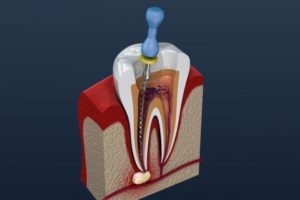 What happens when you hear someone say, “root canal?” You probably grab your cheek, cringe, and hope you’re never forced to experience such a thing. Unfortunately, you may not be so lucky. Tooth decay is a very real thing, and so is dental injury, both of which can cause significant damage to your oral health. When an accident or decay occurs, a root canal in Denton may be the only option. While you may be trembling at the thought, there’s no reason to be scared! Once you learn the benefits to root canal therapy, you’ll see why it doesn’t deserve the bad reputation it receives.
What happens when you hear someone say, “root canal?” You probably grab your cheek, cringe, and hope you’re never forced to experience such a thing. Unfortunately, you may not be so lucky. Tooth decay is a very real thing, and so is dental injury, both of which can cause significant damage to your oral health. When an accident or decay occurs, a root canal in Denton may be the only option. While you may be trembling at the thought, there’s no reason to be scared! Once you learn the benefits to root canal therapy, you’ll see why it doesn’t deserve the bad reputation it receives.
Why Do I Need a Root Canal?
There are many reasons why a root canal may be necessary. When plaque remains on the teeth for too long, it begins to break down the tooth’s enamel and dentin, causing it to become more sensitive. Your dentist in Denton can determine if a root canal is necessary. However, here are a few other signs to look for:
- Prolonged sensitivity and pain while biting down
- Bumps on the gums near affected tooth (look like pimples)
- Discoloration of the affected tooth
- Extreme tooth pain
How Can Root Canal Therapy Help Me?
Performed by dentists and endodontists, root canal therapy is a common dental treatment that is designed to shape and clean the inner parts of your teeth. Unfortunately, root canals have gained a bad reputation because people believe they are painful procedures. They’re intended to eliminate pain caused by infections in your teeth.
What Are the Benefits to Having a Root Canal?
Apart from the fact that it eliminates pain, there are several other benefits to having a root canal, none of which should scare you or cause apprehension.
Treatment is Simple and “Painless”
A small hole is created in the top of the crown. Your dentist will remove any infected tissue and “pulp” (interior areas of the tooth) and begin to shape the inside of the tooth before filling it with a rubber-like material to seal it. Then, you will either receive a filling to seal the tooth or a temporary crown until a permanent one is created.
During the procedure, you’ll receive anesthesia to keep you comfortable and relaxed. Afterward, while there may be minimal discomfort, it will far outweigh the pain felt from an infected tooth.
Relieves Tooth Pain
No one enjoys the pain that comes from an infected tooth, let alone a toothache! If the infection is causing severe pain, you may begin to run a fever, have swelling around your gums and jaw, or have trouble eating. Root canals alleviate that pain, and while you may feel a small bit of discomfort in the few days after the procedure, it will go away, and your mouth will be good as new.
Allows You to Keep Your Real Tooth
If infection grows within the tooth, it can become destabilized and fall out or require your dentist to remove it. However, root canal therapy can address the infection, allowing you to keep your existing tooth and maintain your mouth’s natural appearance.
Don’t let the bad reputation of root canal therapy scare you away. Its benefits far outweigh the pain you’re going through, so talk to your doctor about seeking treatment. Soon, you’ll be on your way to a beautiful, pain-free smile.
About the Author
Dr. Todd Balington, DMD, earned his Bachelor of Science from the University of Florida before obtaining his Doctor of Dental Medicine at the Nova Southeastern University College of Dental Medicine. He has years of experience with treating root canals and knows how to keep his patients comfortable throughout the procedure. In addition, our in-house periodontist, Dr. Naveen Karim, DDS, studied at the University of Texas – Dallas, before earning a doctorate at Baylor College of Dentistry. She has been working in the field for more than four years, and she enjoys caring for her patient’s dental needs. To learn more about our team, contact us via our website or by calling (940) 383-3300.
